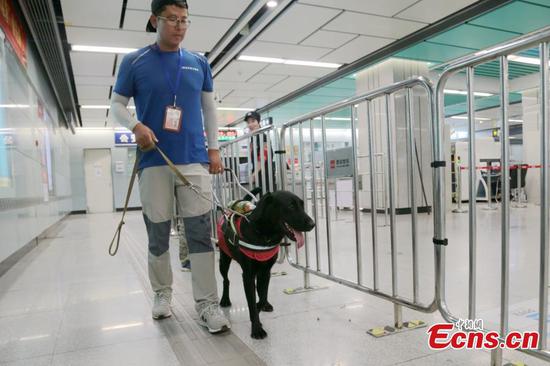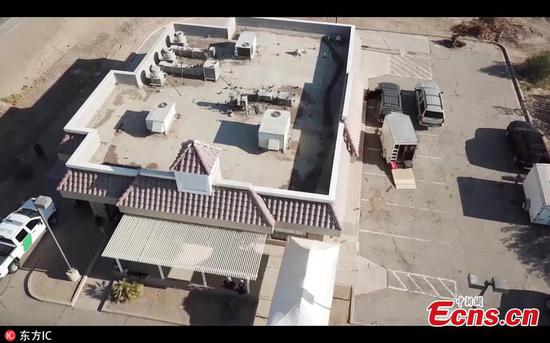Supply and demand
Even though the agencies put more apartments on the market after these meetings with the authorities-which proved that they had been holding apartments in stock-they said publicly that the major reason for the rent rises is a supply shortage, rather than the influence of speculation.
According to a report from Real-Data, a research institution owned by the Lianjia Group, the Beijing municipal government has been tearing down illegal buildings and co-renting apartments to prevent safety risks in recent months, which has led to a reduction in supply.
Tenants who used to favor low-end apartments, which can be shared by several people, had to turn to higher-level ones, which cost more.
In the past year, Beijing has torn down 59.85 million square meters of illegal construction and plans to demolish another 40 million sq m this year.
On the other hand, the city's overall saleable area of apartments in the past year was 8.75 million sq m and its affordable housing area was 2.67 million sq m. Beijing's total floor space for residential buildings is 882 million sq m.
Yang Xianling, chief economist and head of RealData, said the imbalance between supply, which has been falling, and the growing demand-especially from new graduates in summer-was the major reason for the rent increases.
According to the institution, the average rent in Beijing in the first seven months of this year grew by 10.7 percent year-on-year and monthly increases during this time were 2.6 percent on average.
Yang said a growing number of white-collar workers are switching from co-renting apartments to standardized apartments with better furniture provide by the agencies-another reason for the increases.
"This trend-which is a structural improvement for the rental market-will continue for a long time," he said in a report.
He also said people are generally moving into the city's downtown area, where rents are higher.
"The illegal buildings were mainly in suburban areas. People have to find new places to rent nearer the downtown area. New graduates also tend to live downtown where there are more job opportunities. High rents downtown have pulled up the average level," Yang said.
He said the supply shortage is the major cause of the rent increases, and predicted that the number of new tenants will start to fall this month, reducing the level of such rises.
No worries
Liu Ridu, a 38-year-old Beijinger who owns four apartments in the capital, has just raised the rent from 6,000 to 7,000 yuan a month for one of his flats-a 90-sq-m apartment in Jintai Road, off the Third East Ring Road in Chaoyang district.
"I know the rise this year is a bit strange, but for me, seeing that others have raised their rents, why should I refuse more money?" he said.
"I don't rent my apartments to tenants directly. People seldom do that now. We rent to agencies and pay one and a half months' rent as their fee, and then have no worries about keeping tenants. The agencies will do that for us."
Liu said rents had usually risen by about 10 percent annually in recent years. This summer, they increased by 17 percent in the residential community in Jintai Road, where this apartment is located.
A realtor at the Beijing Maitian Real Estate Agency, surnamed Wei, who asked that his full name not be disclosed, said agencies started to speculate on rents in May.
Before May, it took about one month on average to rent out an apartment. But after capital entered the rental market, they take only two weeks or less to rent out, which clearly means that some agencies have been stocking apartments.
"In the past two years, more real estate agencies that used to mainly sell properties started to focus on the leasing business, because the property trading market was weakening," Wei said.
He added that when agencies go to landlords to obtain leasing contracts, they usually offer a price that is 10 percent higher than the average.
Zhang, the chief analyst at Centaline Property, said rents will continue to increase because all the factors contributing to such rises remain.
According to China Economic Weekly, up to 13 first-and second-tier cities in China saw rent increases of more than 20 percent in the past year.
Chengdu, the capital of the southwestern province of Sichuan, ranked top with a rise of 30.98 percent on average, followed by Shenzhen, Guangdong province, with rent growth of 29.68 percent.
Rent increases in Beijing and Guangzhou, the capital of Guangdong, also surpassed 20 percent year-on-year this month.
Zhang Guodong, 32, who works for a travel agency in Beijing, said he is considering moving to a subsidiary in Hangzhou, the capital of Zhejiang province, if the company accepts his proposal.
"The soaring rent may be the final trigger that helps me to make up my mind," he said.
"I have been thinking about this for a few months. More and more white-collar workers in Beijing have moved out to the Sixth Ring Road, which is far from the city center, and it has become common practice to rent a room instead of an apartment to save money. That's not the life I want."
Zhang Guodong said he plans to go to Hangzhou to rent a place that is bigger and nearer the city center.
"I'm willing to work hard and I also want to enjoy my life," he added.


















































